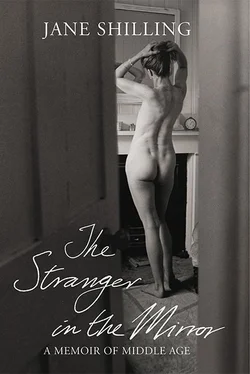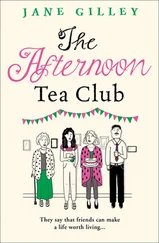I have no confidence in my ability to seize an opportunity. I imagine them as hard, glittering objects; golden apples that hurtle unexpectedly towards you, like the ball in school rounders games that looms out of the air and inflicts a sharp, insulting blow when you are standing in the outfield thinking about something else. In rounders, I invariably fumble the catch. I look again at my mother and wonder with a sudden chill if this is what happens to teenagers who fail to catch the right opportunity: life contracts around them, squeezing them out of shape until one day they find themselves sitting on a tartan rug in a suburban back garden with cracked heels and mottled legs and all the showy-off-ness, all the lusciousness and spirit and infinite possibility of their younger selves squashed out of them, and ahead of them the prospect of what, exactly? Of an inexorable decline into an even more squashed and mottled old age?
Here my train of thought takes a detour, for I am much less troubled by the idea that one day I shall be an old woman, like my grandmother, than I am by the prospect of middle age. It’s not that old age is further off: from the perspective of 17, 70 seems no more remote than 40. More that my two grandmothers have a focus about them, a sense of who they are and what they are for, that I don’t see in my mother. When I look at her, it is as though the winged child on the beach, the long-legged teenager and the shapeless 40-year-old are separate people, ghosts of each other, double exposures. I don’t really know who she is; I don’t think she knows herself, and it is unsettling.
My grandmothers, on the other hand, seem quite clear about who they are. Mrs shilling and Mrs Charlton, they still call each other, though their children – my parents – have been married for twenty years. Grandma Shilling is small and severe and elegantly dressed. She lives in a house of hot and muffled richness, where red velvet curtains hang at the windows, and even over some of the doors. Four white cherry trees stand in a row in her garden, at the bottom of which is a goldfish pond surrounded by tuffets of purple thyme, humming with bees in summer, and a rockery on which blue gentians and an edelweiss are displayed like rare jewels. This grandmother is fond of real jewels also. In the dimness of her pink velvet-curtained boudoir she gets down the jewel box from the top shelf of her wardrobe and opens it to show rows of pearls, a necklace and earrings of silver-gilt and blue enamel like shards of blue and silver light, a butterfly brooch of rubies and sapphires.
Once in a while, she picks up a trinket – a narrow gold bar brooch with a frosting of diamond chips, a necklace of gilt and enamel forget-me-nots – puts it into the palm of my hand and closes my fingers over it. ‘Don’t tell anyone,’ she whispers. From her I learn the rudiments of the secret and complicit grammar of self-adornment. This grandmother is famous for her hats (a different one every time she visits, which she does on Sunday mornings after church, driven by my grandfather in his stately, gunmetal Rover), and for the shameless lies she tells about clothes. ‘Is that a new hat, Grandma?’ ‘Oh, this old thing,’ she says, her gaze as candid as the little shepherdess she once was (well, she grew up on a sheep farm). ‘Had it for years.’
If this grandmother represents the mystery of the grown-up world: jewels, secrets, rare flowers, unfamiliar flavours (it is at her table that I first encounter – with chagrin, since I thought it was a bit of chicken when I put it in my mouth – an anchovy), my Charlton grandmother is the guardian of my childhood. Gentler, more diffident and funnier than her formidable Shilling counterpart, over whom she towers awkwardly on the rare occasions when they meet, like a mild, bemused sheep over a fierce little vixen, she is the thirteenth and youngest child of a north London publican and has led a rackety, hand-to-mouth life as a sailor’s wife. Perhaps it is the insecurity of moving from port to port, of never having a home of her own, not knowing for long stretches quite where her husband is or even, in wartime, whether she will see him again, that has taught her a hard-won sweetness.
When I was small she used to do a lot of baking. Her house smelt sugary, of cherry cake and rhubarb-and-ginger jam, and when she wasn’t cooking, she knitted: intricate, cable-patterned jumpers with stitches as regular as if a machine had made them. Then she got Parkinson’s disease, and the tremor in her hands brought the cooking and knitting to an end. I was 12 when she made me my last jumpers, one in a tawny squirrel colour and another, the same pattern with a cabled front, in wool of a tender dusty pink.
My grandmother’s knitting was indestructible. Outgrown garments were handed down to smaller and ever more distant relations. (Somewhere in the world, I am sure of it, the child of some unknown cousin many times removed is still wearing my squirrel-coloured jumper.) At 17, I could still just about cram myself into the tawny jumper and the pink, and sometimes did, when I suddenly felt a panicky sense of having travelled too fast down the road that led towards the unknown territory inhabited by Janis Joplin and Patti Smith, and a need to retreat to the safer realm of cherry cake and cable knit.
As a child and then a teenager, I do not analyse what it is that makes me feel so close to my grandmothers. I feel safe and happy with them because I know it is the job of grandmothers to make their grandchildren feel safe and happy. I don’t think myself lucky to be showered with love and approval and trinkets and beautifully knitted jumpers. I consider it my due, and I accept their tributes with the magnificent assurance of a little princess.
But from the perspective of middle age it seems to me that the secret ingredient of our cloudless relationship was their composure. That, and a certain frivolity. Both these old women had plenty to be anxious about. They were born Victorians and grew up with the turbulent twentieth century. Both had husbands who went to war, one as a soldier in 1914, one as a sailor in 1939; both were separated by war from their young children; neither led a perfectly secure life; both suffered disappointment, pain and grief.
Though their characters were very different each seemed to me, growing up, to have the steady calm of someone perfectly in command of her own domain and with it an insouciance, a lightness, a capacity almost for silliness unexpected in someone officially old; at any rate, a readiness to take pleasure in small details – a cake, a flower, a hat, a jewel, a robin on the windowsill, a new kitten – that was absent from my own anxious, careworn and heavily hormonal household.
‘Remember,’ said Gloria Steinem, interviewed at 60, ‘when you were nine or ten or 11, and maybe you were this tree-climbing, shit-free little girl who said, “It’s not fair,” and then at 12 or 13 you suddenly turned into a female impersonator who said, “How clever of you to know what time it is!” and all that stuff? Well, what happens is that when you get to be 60, and the role is over, you go back to that clear-eyed, shit-free, I-know-what-I-want, I-know-what-I-think, nine- or ten-year-old girl. Only now – you have your own apartment.’
This is a very American account of ageing, with its sweet Panglossian optimism and its eccentric retrospective characterisation of women from menarche to menopause as ‘female impersonators’. But although there are good reasons to be upbeat about growing old, it is a mistake to think that life’s journey is circular. Getting old does not involve a return to anywhere. It is an onward passage to an unknown destination. The ‘last scene of all’ in Shakespeare’s seven ages of man is ‘second childishness’: not clear-eyed, assertive or even ‘shit-free’, but dwindling towards infantile helplessness and an eventual vanishing into the void from which we were first conjured.
Читать дальше












